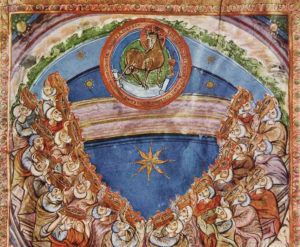7 March OS 2018: Tuesday of the Fifth Week of Lent; Holy Seven Hieromartyrs of Cherson; S. Lawrence of Salamis
The first reading at Vespers today is Genesis 15: 1-15.
“The LORD came unto Abram in a vision, saying, ‘Fear not, Abram; I do shield thee, and thy reward shall be exceeding great.'” But here Abram shows that he is only human, and he questions God: “O Master, O LORD, what wilt Thou give me, seeing I go away childless…?” God does not chastise him, but instead repeats His promise to make Abram’s descendants innumerable, this time comparing them to the stars of heaven, and Abram believed Him: “And Abram believed God, and it was accounted to him for righteousness.”
This passage should console us greatly, since it shows that even a very great and holy man, who is in the state of theoria, of divine vision, can still need to grow in faith and hope in God. This is something that goes on to the end of his life, and to the end of our lives. It shows that God does not chastise us when we question Him with childlike trust, “What wilt Thou give me?” Rather, He reassures us and increases the measure of our faith. Then, if we believe His promise and put our hope in Him, He accounts this to us as righteousness. Not great acts of asceticism or charity, but simply this: an act of faith and hope in Him.
God and Abram do not stop, however, at this noetic and verbal agreement. They make a physical covenant based upon sacrifice. Once again, Abram goes into ecstasy, into the state of divine vision, and he mystically beholds and speaks with God Who comes to make covenant upon the blood of sacrificed beasts of his flock. This is serious business: the cutting of the animals in two signifies, “You may do this to me and more if I break faith with you.”
The same LORD God who made this sacrificial covenant in blood with Abram has made an everlasting covenant with us, by the Blood of the Lamb of God, our Lord Jesus Christ, which purchased us for God. All that we are and all that we have comes from Him; all that we are and all that we have belongs to Him. “For ye are bought with a price: therefore glorify God in your body, and in your spirit, which are God’s (I Corinthians 6:20).” The entire Orthodox way of life – the fasting, the Church services, prayer, correction of our outward habits and inner thoughts, and every aspect of active Christian life – is there to help us glorify God in body and spirit. He has accounted our faith as righteousness; we must show our thanks for His gift by struggling for holiness.

